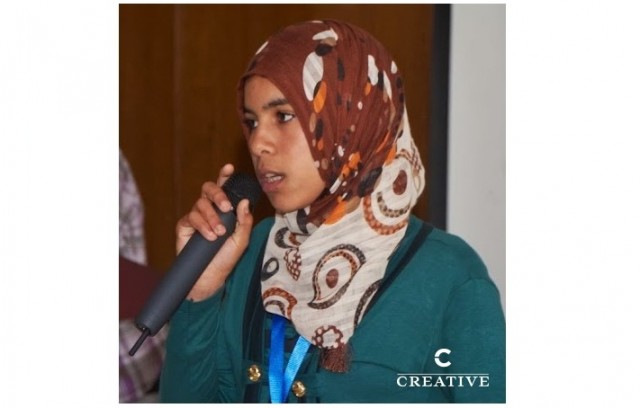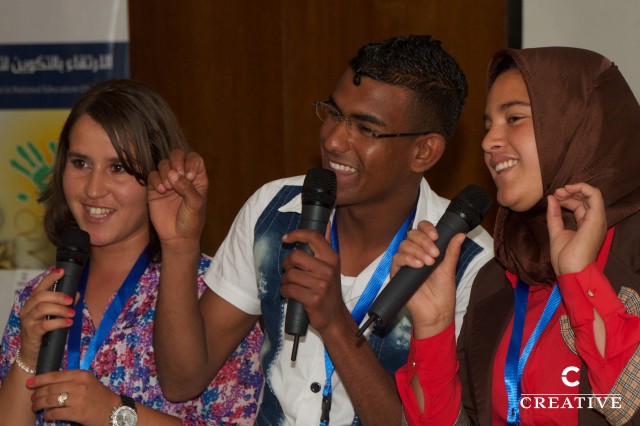[vc_row][largeur vc_column = »1/1″][vc_column_text]
Youth Speak fait entendre la voix des filles
Par Maggie Farrand
[/vc_column_text][/vc_colonne][/vc_row][vc_row][largeur vc_column = »2/3″][vc_column_text]

Rabat, Maroc – Souad Achehabou était une élève star de son école de Jdour, une commune rurale de la province marocaine de Youssoufia, 185 miles au sud de Rabat. Elle adorait étudier et avait hâte d'aller à l'école. Mais elle vivait loin et se retrouvait régulièrement sans moyen de transport fiable.. De nombreux matins, elle ferait du stop. S'inquiéter pour sa sécurité, ses parents lui ont fait pression pour qu'elle abandonne.
«Je ne voulais pas," dit-elle. «J'aime étudier et j'avais hâte de continuer.»
Aux moments où elle était gardée à la maison, elle enverrait des notes à l'école pour demander de l'aide. Ses professeurs répondaient occasionnellement en venant la chercher le matin, et la reconduisait chez elle le soir. Mais les professeurs n'étaient pas toujours disponibles, et la pression de ses parents a continué; bientôt, elle est devenue une autre décrocheuse du collège.
Pour les jeunes filles du Maroc comme Souad, l'abandon scolaire n'est pas rare. Depuis 300,000 à 400,000 les enfants arrêtent leurs études chaque année, dont plus de la moitié sont des jeunes filles. Ils invoquent le manque de sécurité et d'argent, être découragé par les enseignants et le mariage précoce comme raison d'abandonner l'école.
C’est pourquoi, dans le cadre d’une récente initiative de recherche menée par des jeunes qui a étudié le problème de l’abandon scolaire au collège, les filles ont eu la possibilité de raconter leurs histoires.
Called Youth Speak and run by Creative Associates International, it selected middle school students who are personally affected by the problem to lead and conduct research with their peers and other stakeholders—a completely different approach to the adult-driven investigations.
In alignment with the Moroccan government’s efforts to reduce dropout rates, Youth Speak is part of USAID’s Improving Training for Quality Advancement in National Education project, qui est mis en œuvre par Creative.
 Youth Speak focused on six communities that are the hardest hit by the scourge of dropout. Souad’s community of Jdour was one of those selected, and she became a youth researcher. Along with other investigators (half of them were girls), Souad and her fellow researchers interviewed more than 700 in-school and out-of-school youth and community members in the six geographic areas.
Youth Speak focused on six communities that are the hardest hit by the scourge of dropout. Souad’s community of Jdour was one of those selected, and she became a youth researcher. Along with other investigators (half of them were girls), Souad and her fellow researchers interviewed more than 700 in-school and out-of-school youth and community members in the six geographic areas.
Souad and the other researchers developed a survey, organized focus groups and conducted in-depth interviews.
Female participants were asked questions specifically related to girls in school and girls who had dropped out, such as early marriage, safety walking to and from school, family support and harassment. Results show the girls’ unhappiness with road safety and threats of sexual harassment; how their responsibilities around the house limits the time they have for their studies; and the pressure they face to drop out that their brothers or male classmates do not face.
Souad experienced those too: unsafe roads on her walk to school, and lack of support from her brother.
“My brother [dit] that school was not necessary for girls and that good girls don’t travel so far away from home," dit-elle.
Of all the out-of-school girls surveyed, 80 percent expressed an interest in returning to school.
They worked with coaches, the Ministry of Education and Creative to present actions that schools, communautés, families and the government could take to keep youth in school and transition them to work. Their findings were presented to local and national audiences.
The youth researchers provided recommendations like offering extracurricular activities, raising awareness at school of the consequences of not completing an education and encouraging more parental involvement in school activities.
Youth Speak validated students’ perspectives and made it possible for young girls to take a leading role in addressing the school dropout problem. En bref, Youth Speak is a research carried out by youth, avec les jeunes et pour les jeunes.
The program saw impressive results among the team members: Within two months, every out-of-school youth researcher involved in Youth Speak had either returned to middle school or another formal education program—including Souad.
Now she has her parents’ support as she continues her education. She credits Youth Speak for saving her education, her future, and her life.
——————————
Maggie Farrand is a writer and editor at Creative Associates International in Washington, D.C.[/vc_column_text][/vc_colonne][largeur vc_column = »1/12″][/vc_colonne][largeur vc_column = »1/4″][vc_widget_sidebar sidebar_id= »barre latérale-primaire »][/vc_colonne][/vc_row]